Dmitriy Genzel
TorchAudio: Building Blocks for Audio and Speech Processing
Oct 28, 2021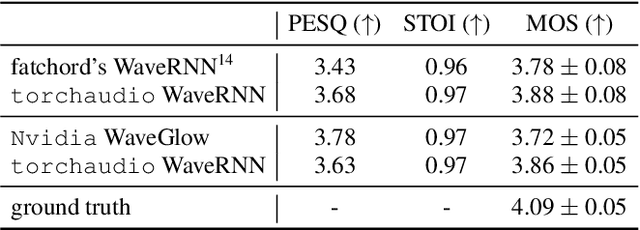

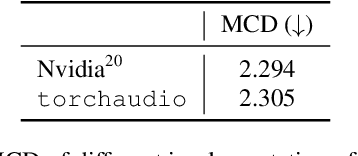

Abstract:This document describes version 0.10 of torchaudio: building blocks for machine learning applications in the audio and speech processing domain. The objective of torchaudio is to accelerate the development and deployment of machine learning applications for researchers and engineers by providing off-the-shelf building blocks. The building blocks are designed to be GPU-compatible, automatically differentiable, and production-ready. torchaudio can be easily installed from Python Package Index repository and the source code is publicly available under a BSD-2-Clause License (as of September 2021) at https://github.com/pytorch/audio. In this document, we provide an overview of the design principles, functionalities, and benchmarks of torchaudio. We also benchmark our implementation of several audio and speech operations and models. We verify through the benchmarks that our implementations of various operations and models are valid and perform similarly to other publicly available implementations.
Improving Speech Translation by Understanding and Learning from the Auxiliary Text Translation Task
Jul 12, 2021



Abstract:Pretraining and multitask learning are widely used to improve the speech to text translation performance. In this study, we are interested in training a speech to text translation model along with an auxiliary text to text translation task. We conduct a detailed analysis to understand the impact of the auxiliary task on the primary task within the multitask learning framework. Our analysis confirms that multitask learning tends to generate similar decoder representations from different modalities and preserve more information from the pretrained text translation modules. We observe minimal negative transfer effect between the two tasks and sharing more parameters is helpful to transfer knowledge from the text task to the speech task. The analysis also reveals that the modality representation difference at the top decoder layers is still not negligible, and those layers are critical for the translation quality. Inspired by these findings, we propose three methods to improve translation quality. First, a parameter sharing and initialization strategy is proposed to enhance information sharing between the tasks. Second, a novel attention-based regularization is proposed for the encoders and pulls the representations from different modalities closer. Third, an online knowledge distillation is proposed to enhance the knowledge transfer from the text to the speech task. Our experiments show that the proposed approach improves translation performance by more than 2 BLEU over a strong baseline and achieves state-of-the-art results on the \textsc{MuST-C} English-German, English-French and English-Spanish language pairs.
Adaptive Sparse Transformer for Multilingual Translation
Apr 15, 2021



Abstract:Multilingual machine translation has attracted much attention recently due to its support of knowledge transfer among languages and the low cost of training and deployment compared with numerous bilingual models. A known challenge of multilingual models is the negative language interference. In order to enhance the translation quality, deeper and wider architectures are applied to multilingual modeling for larger model capacity, which suffers from the increased inference cost at the same time. It has been pointed out in recent studies that parameters shared among languages are the cause of interference while they may also enable positive transfer. Based on these insights, we propose an adaptive and sparse architecture for multilingual modeling, and train the model to learn shared and language-specific parameters to improve the positive transfer and mitigate the interference. The sparse architecture only activates a subnetwork which preserves inference efficiency, and the adaptive design selects different subnetworks based on the input languages. Evaluated on multilingual translation across multiple public datasets, our model outperforms strong baselines in terms of translation quality without increasing the inference cost.
A General Multi-Task Learning Framework to Leverage Text Data for Speech to Text Tasks
Oct 21, 2020



Abstract:Attention-based sequence-to-sequence modeling provides a powerful and elegant solution for applications that need to map one sequence to a different sequence. Its success heavily relies on the availability of large amounts of training data. This presents a challenge for speech applications where labelled speech data is very expensive to obtain, such as automatic speech recognition (ASR) and speech translation (ST). In this study, we propose a general multi-task learning framework to leverage text data for ASR and ST tasks. Two auxiliary tasks, a denoising autoencoder task and machine translation task, are proposed to be co-trained with ASR and ST tasks respectively. We demonstrate that representing text input as phoneme sequences can reduce the difference between speech and text inputs, and enhance the knowledge transfer from text corpora to the speech to text tasks. Our experiments show that the proposed method achieves a relative 10~15% word error rate reduction on the English Librispeech task, and improves the speech translation quality on the MuST-C tasks by 4.2~11.1 BLEU.
TICO-19: the Translation Initiative for Covid-19
Jul 06, 2020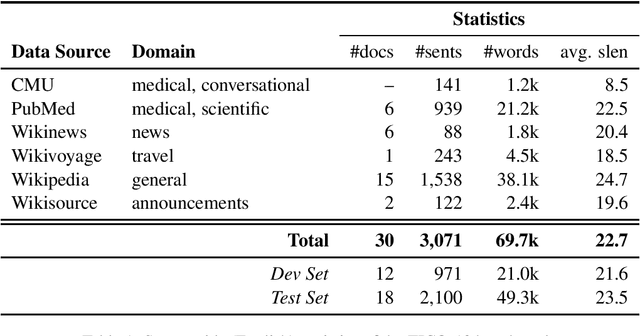
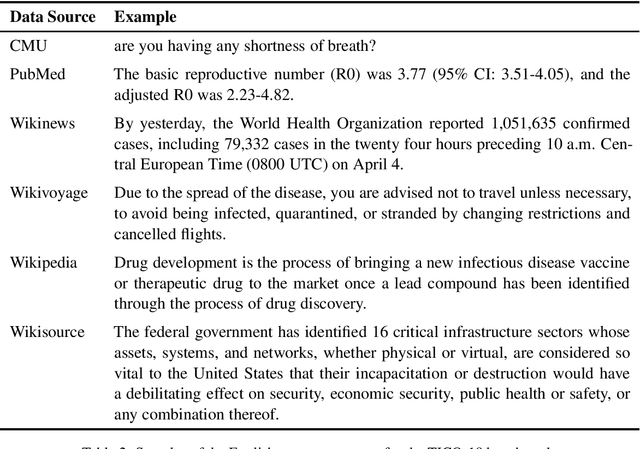
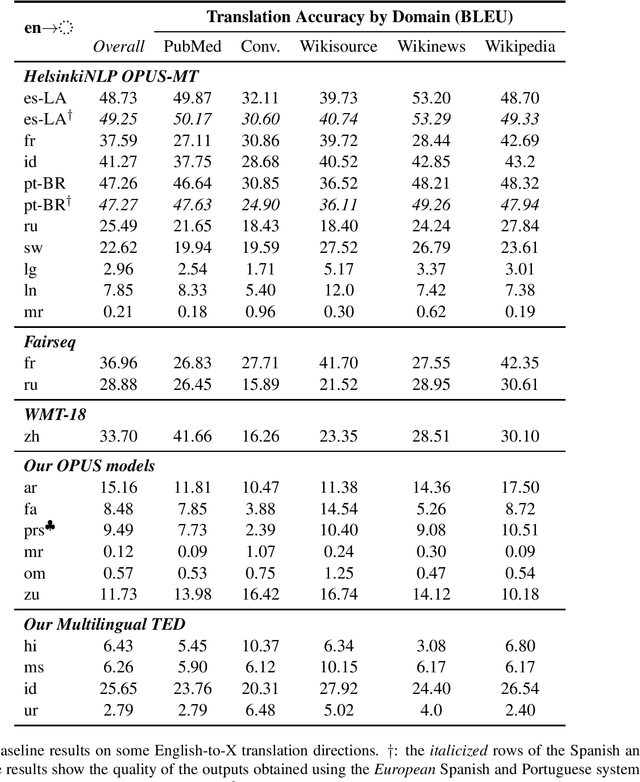
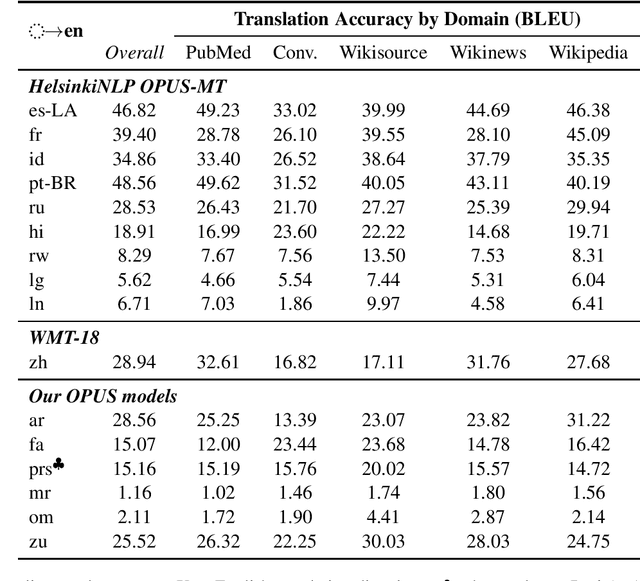
Abstract:The COVID-19 pandemic is the worst pandemic to strike the world in over a century. Crucial to stemming the tide of the SARS-CoV-2 virus is communicating to vulnerable populations the means by which they can protect themselves. To this end, the collaborators forming the Translation Initiative for COvid-19 (TICO-19) have made test and development data available to AI and MT researchers in 35 different languages in order to foster the development of tools and resources for improving access to information about COVID-19 in these languages. In addition to 9 high-resourced, "pivot" languages, the team is targeting 26 lesser resourced languages, in particular languages of Africa, South Asia and South-East Asia, whose populations may be the most vulnerable to the spread of the virus. The same data is translated into all of the languages represented, meaning that testing or development can be done for any pairing of languages in the set. Further, the team is converting the test and development data into translation memories (TMXs) that can be used by localizers from and to any of the languages.
 Add to Chrome
Add to Chrome Add to Firefox
Add to Firefox Add to Edge
Add to Edge